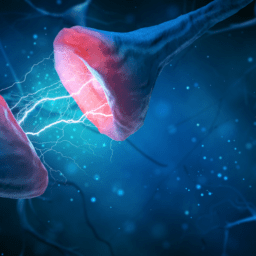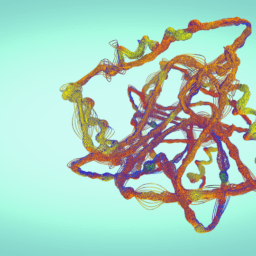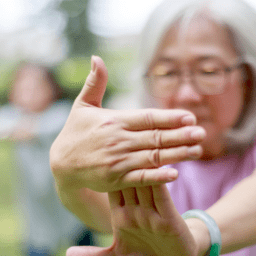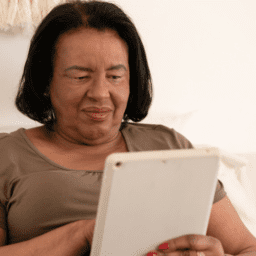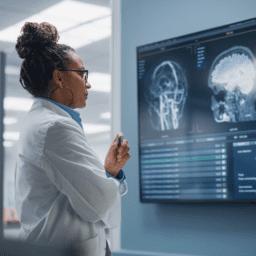Sesame seeds, olives, skin swab tests, mitochondrial function, barbershop dreams, canine super smellers, Argentine tango, and more — all are part of this month’s Parkinson’s news collection. Check out the most important stories happening now and let us know if we missed anything. Happy reading!
PARKINSON’S ARTICLES AND PODCASTS
- To better understand the relationship between Parkinson’s and the gut microbiome, a team of researchers with the Quadram Institute Bioscience in the UK conducted a meta-analysis of 10 previous studies on the subject, which in total included data on 1,269 people with and without Parkinson’s. They found that people with Parkinson’s generally had more diverse gut microbiomes; lower levels of bacteria that are usually abundant in the guts of people without Parkinson’s; and higher levels of bacteria that are typically rare in the “healthy gut.” Researchers hope studies and analyses of gut health and Parkinson’s will help them discover how the restoration of a balanced microbiome in people with Parkinson’s could alleviate some symptoms.
- Sebum, an oily material found in human skin, may be the key to early detection of Parkinson’s. Scientists at the Manchester Institute of Biotechnology are investigating molecular changes in the skin that may cause people with Parkinson’s to give off a unique scent, often described as woody and musky. This research could pave the way for a non-invasive, effective skin swab test that could lead to earlier diagnosis and treatment.
- In the journal Science Advances, researchers from the Hebrew University of Jerusalem highlight how constipation may be an early potential biomarker for Parkinson’s. While non-Parkinson’s constipation is usually centered in the large intestine, constipation caused by Parkinson’s seems to impact the upper gastrointestinal tract. Using alpha-synuclein and a mouse model, the team discovered the way Lewy bodies, tiny deposits of protein waste within brain cells, impact the upper gastrointestinal system, highlighting for the first time a “causal chain of events connecting how alpha-synuclein protein impacts brain cells and the early symptoms that we have long known predate” Parkinson’s, the lead researcher says.
- Could a sesame seed throwaway slow the progression of Parkinson’s? Researchers at Osaka City University are exploring that idea, having discovered that a chemical called sesaminol, abundant in empty shells typically discarded in the sesame seed oil extraction process, has protective effects against Parkinson’s. In a series of in vitro and in vivo experiments, the team found that sesaminol protected against neuronal damage and, in a mouse model, led to an increase in dopamine levels.
- In other food-related news, a study conducted at Panjab University found that hydroxytyrosol, a compound found in olives, may help maintain dopamine levels in people with Parkinson’s by targeting an enzyme responsible for dopamine loss.
- University of Maryland scientists published a report in APL Bioengineering that explains how a growing body of research suggests that sex differences play a role in the body’s response to neurological diseases like Parkinson’s and Alzheimer’s. The blood-brain barrier, which is designed to prevent unwanted molecules from entering the brain, is built and behaves differently in males and females, and researchers believe these differences might explain why Parkinson’s impacts more men than women.
- A study recently published in Brain found that people with Parkinson’s had significantly higher levels of iron in certain parts of their brains when compared to controls. To explore why, the researchers analyzed gene expression data for patterns in the areas of the brain where iron accumulates in people with Parkinson’s. They found that these brain regions had high expression of genes related to synaptic function (the way neurons communicate through chemical messages), high expression of genes related to detoxifying heavy metals, and that they were enriched for certain types of cells, including neurons that release glutamate (a signaling molecule), and astrocytes, a type of support cell in the nervous system. The researchers hope their findings will provide insights into future therapies that can slow the progression of Parkinson’s.
- Led by the University of Sheffield’s Neuroscience Institute, an international study published this month in Scientific Reports found that a deficiency in the PINK1 gene resulted in fewer dopamine-producing neurons being made throughout life and is not simply responsible for the premature death of these neurons, as was previously believed. The researchers believe this finding may have a significant impact on future treatments for people who develop Parkinson’s due to PINK1 defect or similar gene defects.
- A research team at Queen Mary University of London has identified various markers of inflammation that circulate in the blood, such as the presence of certain proteins and immune cells, that could lead to earlier diagnosis of Parkinson’s. The study supports earlier research on how changes in lymphocyte count may be linked to increased risk of Parkinson’s and could be picked up on routine blood tests years before diagnosis.
- Scientists at the Wisconsin National Primate Research Center, part of the University of Wisconsin–Madison, have successfully reversed Parkinson’s symptoms, including movement difficulties and depression, in monkeys by grafting dopamine-producing cells into their brains. By growing the dopamine cells from the monkeys’ own cells, the research team avoided immune rejection. The study’s findings, published in the journal Nature Medicine, raise hopes of a new, effective treatment for Parkinson’s.
- The 2021 Parkinson’s Policy Forum took place the week of March 22-26 and included virtual meetings with legislators to ask for increased federal investment in Parkinson’s research.
- On the latest Help with Parkinson’s podcast episode, speech-language pathologist Kari Hoffer talks about cognitive symptoms of Parkinson’s and how to manage them to improve your quality of life.
- A March episode from The Parkinson’s Vitality Project Podcast features an interview with Davis Phinney Foundation Ambassador Brett Miller, who discusses his wellness center, 110 Fitness, and how exercise is a key component to living well with Parkinson’s.
- On a recent Parkinson’s Experience podcast episode, the hosts talk about canine “super smellers” that can sniff out Parkinson’s, and they learn from the program director and a dog handler how this could change the way Parkinson’s is diagnosed.
PARKINSON’S THERAPIES AND MEDICATIONS
- Parkinson’s UK has awarded researchers at the Sheffield Institute for Translational Neuroscience £1.2 million ($1.67 million) to develop new treatments that slow the progression of Parkinson’s. With the award, the research team that has been investigating the function of mitochondria in Parkinson’s will now work with drug discovery experts to develop a drug that they hope can restore mitochondrial function in the brain and slow or halt Parkinson’s progression.
- Research continues to prove that exercise benefits the brain. Findings from a recent study showed that sedentary, older adults who took aerobic dance classes twice a week saw improvements in brain areas critical for memory and thinking. The researchers discovered that participating in the dance classes spurred “unconnected portions of the brain’s memory center to start interacting in complex and healthier new ways…sharpening memory function.”
- Dance can help you live well with Parkinson’s in other ways as well, as highlighted in a recent study about the tango, published in the Journal of the American Medical Directors Association. Researchers at Florida State University found the techniques used in Argentine tango help people with Parkinson’s maintain balance and can decrease fall risk. Another sport recently found to help with balance in people with Parkinson’s? Golf.
- The biopharmaceutical company Newron Pharmaceuticals has signed an agreement with Zambon regarding a study to evaluate the efficacy of safinamide in people with Parkinson’s who experience levodopa-induced dyskinesia. The double-blind, placebo-controlled study, to be performed in the US, Europe, Asia, and Australia, has the aim of a label extension covering levodopa-induced dyskinesia for safinamide. Safinamide has previously been approved for the treatment of Parkinson’s as add-on therapy to levodopa/carbidopa.
- Recognizing the need for non-pharmacological interventions to improve sleep for people with Parkinson’s, Cambridge Sleep Sciences has developed a new device, SleepHub, that uses rhythms and pulses to emulate brain waves produced during sleep, helping to restore a person’s natural sleep cycles. Cambridge Sleep Sciences is now partnering with Parkinson’s Concierge to assess SleepHub’s effectiveness in people with Parkinson’s before moving forward to the clinical trial phase.
- Another non-pharmacological treatment for poor sleep in Parkinson’s? High-intensity exercise. In a National Institutes of Health report in March, researchers explain how exercise performed at moderate to maximal intensities significantly improved participants’ reported quality of sleep.
- An interim analysis suggests that ANVS401, an investigational therapy for neurodegenerative diseases being developed by Annovis Bio, improved speed and coordination in people with Parkinson’s. In a test measuring the speed of execution, treatment with ANVS401 significantly improved scores among people with Parkinson’s, with the difference being significant both in comparisons to the placebo group and to the participants’ baseline values. The Annovis-sponsored trial is currently recruiting participants at multiple locations in the US; additional information is available here.
- EvaluateVantage believes 2021 is “shaping up to be crucial” for the Parkinson’s field and offers a look into the pipeline of projects in active late-stage clinical trials for Parkinson’s treatments, including 10 studies expected to yield data or to be completed this year.
PARKINSON’S LIVING WELL STORIES
- More than a decade after being diagnosed with young-onset Parkinson’s (YOPD), Keith Letarski has become an endurance athlete and recently completed a three-hour mountain adventure challenge that included snowshoeing, running, cycling, and downhill sledding. He says that living well with Parkinson’s “is about setting aside the limitations” and making the most of what he can do.
- Three students at Purdue University Polytechnic Institute have invented a prototype utensil called “the Seal Spoon,” which features a sliding cover to keep food and liquid from falling out, even when the hand holding it is shaking. The “Techie Team” trio has received a $25,000 grant to continue the product’s development, and the students, two of whom have family members living with Parkinson’s, hope to make the Seal Spoon commercially available.
- On PD Wise, Allan Cole discusses how his dreams of a “barbershop community” have been replaced with the Parkinson’s community. “Both worlds offer opportunities for connection, friendship, laughter, telling stories, sharing burdens, and talking about things that matter. In both places, you can come as you are, stay for a while, and feel welcomed, valued, cared for, and even cool, regardless of how you look or move.”
- “The benefits you get from the exercise are very similar to the benefits you get from taking a pill of the dopamine replacement that we give for Parkinson’s.” Dr. Kathleen McKee, a clinical movement disorder neurologist, and Jennifer Crist, who was diagnosed with YOPD at age 49, share how boxing and other high-intensity exercises can slow the progression of Parkinson’s.
- In honor of Parkinson’s Awareness Month, a YMCA in Florida is hosting a Tulip Drop event to celebrate and support the local Pedaling For Parkinson’s™ class. The teacher of the class says it’s “supporting and motivating at the same time. It’s inspiring to me to be able to teach this class. Members have the courage to fight [and] show up every week for every class without fail. To me, that’s inspiring and encouraging.”
PARKINSON’S Events
The Shirley Ryan Ability Lab is hosting a Virtual Parkinson’s Open House on Thursday, April 1 from 9-11 am MDT to celebrate Parkinson’s Awareness Month. Topics discussed will include:
- Rehabilitation and interdisciplinary care: what, why, and how
- Ways to address mental health and well-being
- Updates in rehabilitation research and bringing new discoveries to clinical care
PARKINSON’S SURVEYS, CLINICAL TRIALS, and volunteer opportunities
PAIRing Up – If you are a person with Parkinson’s or a care partner to someone with Parkinson’s, you are invited to participate in an online survey to address neuropsychiatric (cognition, depression, anxiety) concerns in Parkinson’s. The survey aims to learn about the needs and priorities for clinical care, education, support, and research as related to neuropsychiatric symptoms. To learn more and participate, click here to download the flyer.
The University of Oulu, along with collaborators from Aalborg University, Fraunhofer University, the University of Manchester, the University of Glasgow, the University of Lisbon, and the University of Melbourne, is conducting a survey for people with Parkinson’s and Parkinson’s care partners about self-care. Complete the survey here to share your self-care strategies and techniques. You can also review ideas submitted by others and add them to your own self-care toolbox.
Parkinson’s Progression Markers Initiative (PPMI) Screen Survey – The Michael J. Fox Foundation
Home-based Exercise and Cognitive Behavior Therapy – University of Alabama in Huntsville
Speech and Telemedicine Study – The Purdue Motor Speech Lab
Home Based Tele-exercise Study for People with Chronic Neurological Impairments – Burke Neurological Institute
Parkinson’s and Drooling – European Parkinson’s Disease Association (EPDA)
Parkinson’s and Service Dogs – University of Groningen, Netherlands
Neurology Study Interest Registry – University of Rochester
Park Test – University of Rochester
Project Euphonia – LSVT Global and Project Euphonia
BouNDless – Phase 3 trial to investigate the efficacy, safety, and tolerability of ND0612, a continuous subcutaneous levodopa/carbidopa delivery system in comparison to oral levodopa/carbidopa in people with Parkinson’s experiencing motor fluctuations
WANT MORE PRACTICAL ARTICLES LIKE THIS?
Much more can be found in our Every Victory Counts® manual. It’s packed with up-to-date information about everything Parkinson’s, plus an expanded worksheets and resources section to help you put what you’ve learned into action. Request your free copy of the Every Victory Counts manual by clicking the button below.
Thank you to our 2021 Peak Partners, Adamas, Amneal, Kyowa Kirin, and Sunovion, for helping us make printing, distributing, and shipping the Every Victory Counts manual possible.






